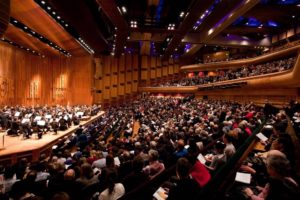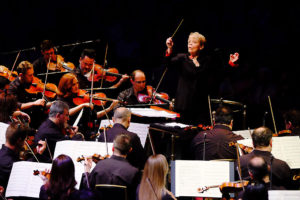This catchy little phrase is part of the current classical music marketing for London’s Southbank Centre (which includes the Royal Festival Hall). It’s a great statement because it’s true: nothing beats the experience of live music.
A recording is a snapshot, a moment frozen in time, and once committed to disc it is a permanent record (forgive the pun) of the music at that time, on that date. No matter how heart-stoppingly beautiful, thrilling or contemplative the music is, a recording cannot ever reproduce the sheer excitement of hearing, and seeing, music performed live in concert.

Classical concert at The Barbican
As a young child, I attended many concerts with my parents and that is how my love of live music developed. I was fascinated by the musicians of the orchestra, their special rituals and adjustments to their instruments – the string players tightening strings, woodwind players preparing reeds, brass players emptying condensation from the tubes of their instruments – and how they would coalesce as one under the conductor’s baton to produce sounds that seemed to go right through you, visceral and vital. Sometimes, we sat in the choir stalls behind the orchestra, almost near enough to read the score of the percussion section, and this close proximity to musicians working and creating music had a special thrill of its own. When I joined my school orchestra, I appreciated this even more fully, the sense of being part of a greater creative whole.
For musicians playing live is the culmination of many hours, days and months of meticulous focussed practising and preparation. It endorses and validates what goes on in the privacy of the practice room, holds the music up for scrutiny and offers insights about the music and the music-making process which simply cannot be obtained in the practice room. Live music is also a sharing experience, and hearing music in concert celebrates common cultural values (identity, history). It is a “cultural gift”, a gift to oneself and a gift to those who love to listen to music. It brings pleasure to performer and to audience – both in terms of pure “entertainment” and also the pleasures of intellectual stimulation and challenge, or being emotionally moved. Alongside this, performing gives voice to the human condition and the meaning of life, and examines and confronts shared values in ways which transcend spoken language.

Marin Alsop conducting
Live performance also confirms the paradoxical maxim “through discipline comes freedom”, that the hours of deep practising give the musicians the confidence to step back and set the music free, performing “in the moment” and even allowing themselves an element of risk which can have the audience on the edge of their seats, gasping in awe at the bravura and audacity which is, literally, playing out before them.
Musicians talk of the special atmosphere that comes from a specific venue – and each venue, large or small, will have its own ambiance which can support and inspire a performer. Those moments when one senses every single member of the audience listening intently, hardly daring to breathe during the most intimate moments in a late Beethoven sonata can never truly be recreated on disc, no matter how brilliant the performer is.
Classical music is beautiful, lyrical, tender, sensuous, angry, thrilling, bombastic, noisy, gentle, relaxing, challenging, thought-provoking, entertaining, witty, funny….and a hundred other descriptions, all of which are brought to life in magical, colourful ways in a live performance. The full force and energy of a large symphony orchestra playing Mahler’s 6th Symphony or Elgar’s Dream of Gerontius can literally take your breath away or produce goosebumps simply from the sheer depth of expression or turn of phrase – things which we may not be able to express in words. Being drenched in sound, removed from the humdrum of everyday life, for a few hours at least, can be invigorating and cathartic – because music has the power to stimulate, provoke, comfort and transport head, heart and spirit all at once.
“To join other people in a concert hall as members of a broader community to share in a journey of the imagination and emotions can be a unique and deeply moving experience.”
Marin Alsop, conductor




